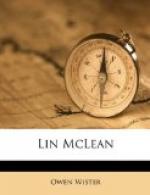I saw a sorry spectacle in the street—the bridegroom and the bride shopping together; or, rather, he with his wad of bills was obediently paying for what she bought; and when I met them he was carrying a scarlet parasol and a bonnet-box. His biscuit-shooter, with the lust of purchase on her, was brilliantly dressed, and pervaded the street with splendor, like an escaped parrot. Lin walked beside her, but it might as well have been behind, and his bearing was so different from his wonted happy-go-luckiness that I had a mind to take off my hat and say, “Good-morning, Mrs. Lusk.” But it was “Mrs. McLean” I said, of course. She gave me a remote, imperious nod, and said, “Come on, Lin,” something like a cross nurse, while he, out of sheer decency, made her a good-humored, jocular answer, and said to me, “It takes a woman to know what to buy for house-keepin,”; which poor piece of hypocrisy endeared him to me more than ever. The puncher was not of the fibre to succeed in keeping appearances, but he deserved success, which the angels consider to be enough. I wondered if disenchantment had set in, or if this were only the preliminary stage of surprise and wounding, and I felt that but one test could show, namely, a coming face to face of Mr. and Mrs. Lusk, perhaps not to be desired. Neither was it likely. The assistant rain-maker kept himself steadfastly inside or near the barn, at the north corner of Cheyenne, while the bride, when she was in the street at all, haunted the shops clear across town diagonally.
On this Friday noon the appearance of the metal tube above the blind building spread some excitement. It moved several of the citizens to pay the place a visit and ask to see the machine. These callers, of course, sustained a polite refusal, and returned among their friends with a contempt for such quackery, and a greatly heightened curiosity; so that pretty soon you could hear discussions at the street corners, and by Saturday morning Cheyenne was talking of little else. The town prowled about the barn and its oracular metal tube, and heard and saw nothing. The Governor and I (let it be confessed) went there ourselves, since the twenty-four hours of required preparation were now begun. We smelled for chemicals, and he thought there was a something, but having been bred a doctor, distrusted his imagination. I could not be sure myself whether there was anything or not, although I walked three times round the barn, snuffing as dispassionately as I knew how. It might possibly be chlorine, the Governor said, or some gas for which ammonia was in part responsible; and this was all he could say, and we left the place. The world was as still and the hard, sharp hills as clear and near as ever; and the sky over Sahara is not more dry and enduring than was ours. This tenacity in the elements plainly gave Jode a malicious official pleasure. We could tell it by his talk at lunch; and when the Governor reminded him that no rain was contracted for until the next day, he mentioned




